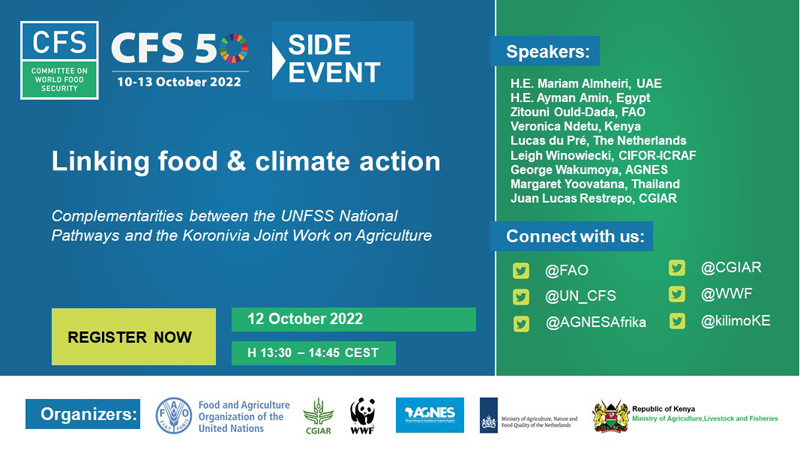Side event at the 50th Session of the Committee on World Food Security (CFS)
Linking food & climate action: complementarities between the UNFSS National Pathways and the Koronivia Joint Work on Agriculture

The on-going global food systems and climate crises are deeply interconnected. In 2017, the UNFCCC Conference of Parties recognized this linkage by setting up the Koronivia Joint Work on Agriculture (KJWA). This is only sectoral programme focusing on agriculture and food within the climate space. Since then, the topic has gained increasing attention, reaching its peak at the UN Food Systems Summit in 2021, which helped to raise awareness in the global community on the need to radically reform not only agriculture but our food systems to address the climate challenge. At COP 27 decisions must be made on the future of the KJWA and broadening its scope to food systems which mean to include Food Loss and Waste and diets is urgently needed.
While today there is increased understanding and commitment on the need to transform food systems, the actions identified during the KJWA and UNFSS processes lack integration. This event will engage speakers and the audience in a discussion around areas of convergence and synergies between the KJWA outcomes, and the national pathways of food systems transformation which came out of the UNFSS and the UNFSS Coalitions. The session will also explore the roles that stakeholders including the Committee on Food Security can play in bringing the post-summit process and the KJWA outcomes together and further strengthen Actions for the UN FSS Coalition
Objectives of the session are to:
- Identify complementarities and synergies between the national pathways, the UNFSS Coalitions and KJWA and discuss mechanism to bring the two processes together,
- Discuss how to engage key stakeholders in climate and food systems discussions on the way to COP 27 and COP 28,
- Exchange on ways to bring all stakeholder on board for a better understanding of food, climate and resilience nexus,
- Explore the role that CFS and other stakeholders can play in bringing the post-summit process and the KJWA outcomes together,
- Reflect on how CFS policy products can contribute to implementing the UNFSS national pathways.













